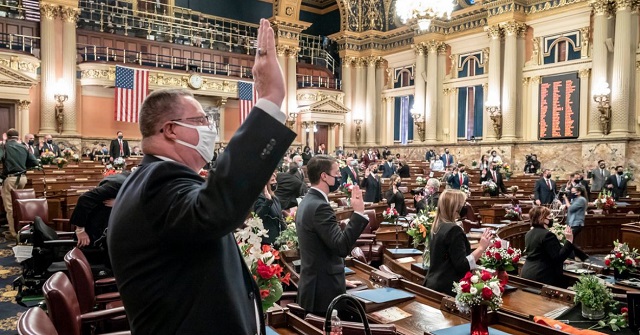
America’s past tells us the farce in Pennsylvania on Jan.05 and the tragedy in the Capitol Jan.06 have something unsettling in common.
ANALYSIS | RICHARD PRIMUS | One day before a political mob stormed the U.S. Capitol, a less violent breach of norms dominated the day in a different capitol building, a hundred miles away. In Harrisburg, Pennsylvania, during the ceremonial swearing-in of recently elected state senators, the chamber’s Republican majority refused to seat a Democratic colleague because his Republican opponent was still trying to challenge his certified election win in court. When the chamber’s presiding officer—Lieutenant Governor John Fetterman, also a Democrat—declared that motion out of order, the Republicans voted to remove him and hand parliamentary control to the Senate’s senior Republican, essentially taking control of the chamber.
Commentators described the events as ominous: a legislative majority using its brute power to deny the choice of the actual voters of Pennsylvania’s 45th District—who, as of today, still have no state senator. The Harrisburg power play lacked the dramatic violence of the assault on the U.S. Capitol one day later, but it was shocking in its own way, not least because the people breaking the norms were elected legislators and not a mob of outsiders.
As unusual as it seemed, however, it wasn’t entirely unprecedented. The Pennsylvania Statehouse had seen something like it before, more than 200 years ago. And although the eighteenth-century incident that this week’s Harrisburg antics evoke might seem like a humorous historical anecdote now, it also shows why conduct of the kind that occurred in the Pennsylvania Senate this week is genuine cause for worry—and more related than it might seem to the mob scene in Washington one day later.
The year was 1787, and the issue was whether to ratify the new U.S. Constitution. Congress had sent the proposed new Constitution to the state legislatures and asked them to hold ratifying conventions. In Pennsylvania, a small majority in the Legislature favoured the new Constitution. But the sizable minority opposed to it was determined to prevent the state from ratifying. Lacking the votes to defeat a resolution calling a ratifying convention, the minority members decided simply to prevent any legislative business at all. Rather than accept a loss, they refused to show up to the chamber, denying the majority the quorum necessary to do business.
It probably seemed like a smart tactic. But the Constitution’s supporters were as determined to have their way as the opponents were to have theirs. So several supporters of the majority went to the Philadelphia boardinghouse where two of the absent opponents resided, physically seized them, dragged them into the legislative chamber, and forcibly prevented them from leaving the room, thus creating the minimum attendance necessary for a quorum.
The game wasn’t quite up, though. One of the anti-ratification legislators who had been dragged back to the chamber cleverly announced that he was then and there resigning his seat. That way, he figured, he could deny the Legislature a quorum even though his body was physically present. But the presiding officer, who was a member of the pro-ratification majority, declared the attempted resignation ineffective. (The grounds of that decision were not quite clear.) That preserved the quorum. The Legislature proceeded to call a convention, and Pennsylvania ratified the Constitution.
 The Independent Uganda: You get the Truth we Pay the Price
The Independent Uganda: You get the Truth we Pay the Price


